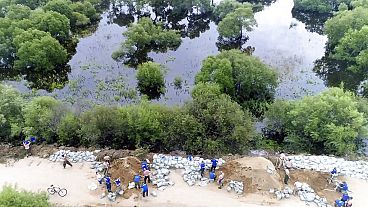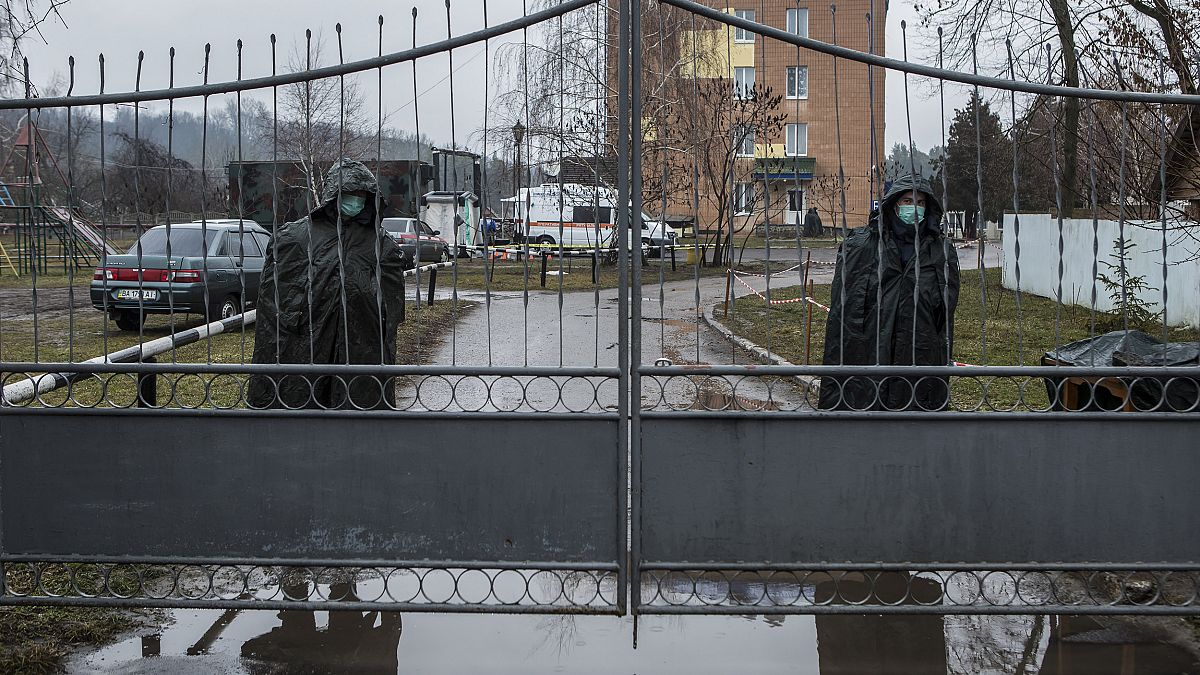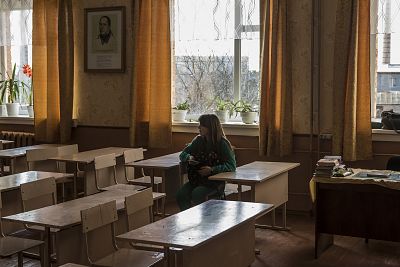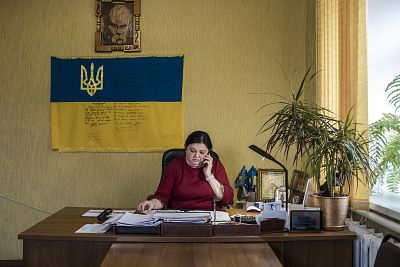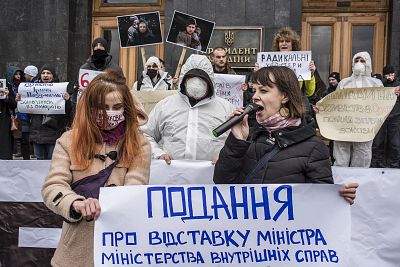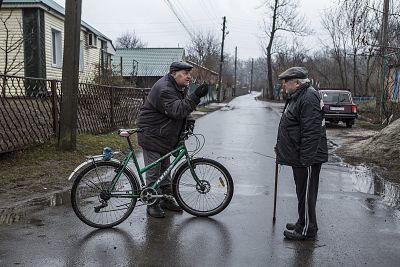"They didn't mean to be violent. They were scared. Information waves went out of control," said the leader of the local council.
NOVI SANZHARY, Ukraine — By the time the riot police turned up, things were already out of control.
In this rural Ukrainian town of about 8,000 people, residents reacted with anger after evacuees from the center of the coronavirus outbreak in China were airlifted to a nearby medical facility last month.
As a fog of confusion and disinformation fueled by social media swirled around, protesters blocked roads with vehicles and threw stones at buses carrying the evacuees. The national guard and armored personnel carriers joined riot police in trying to calm the situation. After a tense standoff, authorities eventually managed to unblock the road.
Police said that nine officers were injured and that 24 people were arrested. Five were charged with organizing the riots. Several countries were evacuating their citizens from China at the same time — but such a violent reaction wasn't seen anywhere else.
The incident shows that as the novel coronavirus continues to spread across the world, infecting nearly 90,000 people and killing at least 3,000 of them, various forms of misinformation follows it. Governments are fighting not just the disease but also rising panic.
Full coverage of the coronavirus outbreak
On Feb. 20, 45 Ukrainians and 27 foreign national evacuees were airlifted to Kharkiv from Wuhan, the Chinese city where the novel coronavirus is thought to have originated.
As the rumors started to swirl on social media, fears began to grow among the residents of Novi Sanzhary, a town 110 miles away in central Ukraine, that the evacuees could be headed here.
"It was a Viber message my friend sent to me and somebody sent to her before," Tetiana Artamonova, 45, an entrepreneur, said in an interview.
The confirmation that the evacuees were, indeed, going to be quarantined at a nearby national guard medical center spread like wildfire, according to Artamonova, who lives nearby.
Also circulating was the rumor that some of the evacuees had contracted COVID-19, the disease caused by the coronavirus. Ukraine didn't confirm its first case of the disease until Tuesday, March 3.
Criticizing the protests the next day, Ukrainian President Volodymyr Zelenskiy said: "We keep saying that Ukraine is Europe. Yesterday it seemed that we are medieval Europe."
But Artamonova said a lack of information from authorities stoked anger and fear among local people, which was heightened by social media reports and speculation by politicians.
She and other people NBC News spoke to said they would have reacted differently if the government had prepared them for the evacuees' arrivals.
"Nobody warned us," said Inna Koba, 53, the head of Novi Sanzhary's council. "Because of the media, people knew that it was a deadly virus, and they wanted to protect their kids.
"I don't support the aggressive people, but I can understand them. They didn't mean to be violent. They were scared. Information waves went out of control."
Ukrainian Health Minister Zoryana Skaletska said the government decided to keep the details about the evacuations secret because it was concerned about the safety of those traveling.
Insisting that the government had done everything it could to keep people safe, she said: "You can always blame the government. However, if certain people want to organize provocations, they would do it anyway."
She added that the government had been informing people about the coronavirus before the evacuees arrived.
Download the NBC News app for breaking news and politics
Politicians in Ukraine's capital, Kyiv, and the regions of Lviv, Ternopil and Poltava, where Novi Sanzhary is, had also been briefing and posting information on social media about the outbreak in a bid to stop it from spreading.
And the national government also told people that none of the evacuees had been diagnosed with the coronavirus on the day of their arrival. But it wasn't enough to prevent panic.
Koba admitted that she had failed to keep residents of Novi Sanzhary informed about the coronavirus, but she said she had assumed that it would not affect them.
"Coronavirus was so far away from us. People prayed it would never come to our town," she said.
Koba, who said she learned about the evacuation from Facebook, blamed Oleh Syniehubov, the governor of the Poltava region, for not having informed her.
But the governor said he did not learn of the evacuation until the morning of Feb. 20, saying Koba should have called him first, as soon as she knew that protests were starting in town. He admitted, however, that he had not called the central government to find out more and had instead waited for official information.
He said the people of Novi Sanzhary were "provoked."
"Fake news about the government's plans to bring sick people into their town started spreading on February 19. Police are investigating who started it," he said.
As for Zelenskiy, his office said it has been conducting daily briefings on the coronavirus situation at home and abroad both before and after the Novi Sanzhary incident.
"The medical status of the evacuees could change, and Ukraine had to be ready to receive its citizens if they were healthy or infected or even if they were extremely ill," said Zelenskiy's spokeswoman, Yulia Mendel.
"The decision on which medical institution a person should be sent to depends on the medical condition," she added.
Mendel said the president's office was in touch with social media companies to prevent the spread of similar disinformation in the future, while a police investigation is underway to trace the source of any disinformation campaign.
Meanwhile, back in Novi Sanzhary, residents are hoping life will return to normal on Thursday, the last day the evacuees are due to leave if they are clear of the illness.
Medical tests proved that all the evacuees were healthy, the Health Ministry said last week.
However, Italy is a longstanding destination for Ukrainians seeking work, and about 70,000 live in the Italian provinces of Lombardy and Veneto, where most of Italy's 1,694 cases so far have emerged and several towns are on lockdown.
As a result, the Ukrainian government has started strengthening border controls at airports and land crossings.
"We've been expecting this threat from Asia, but it emerged it is coming from Europe, too," Syniehubov said.


